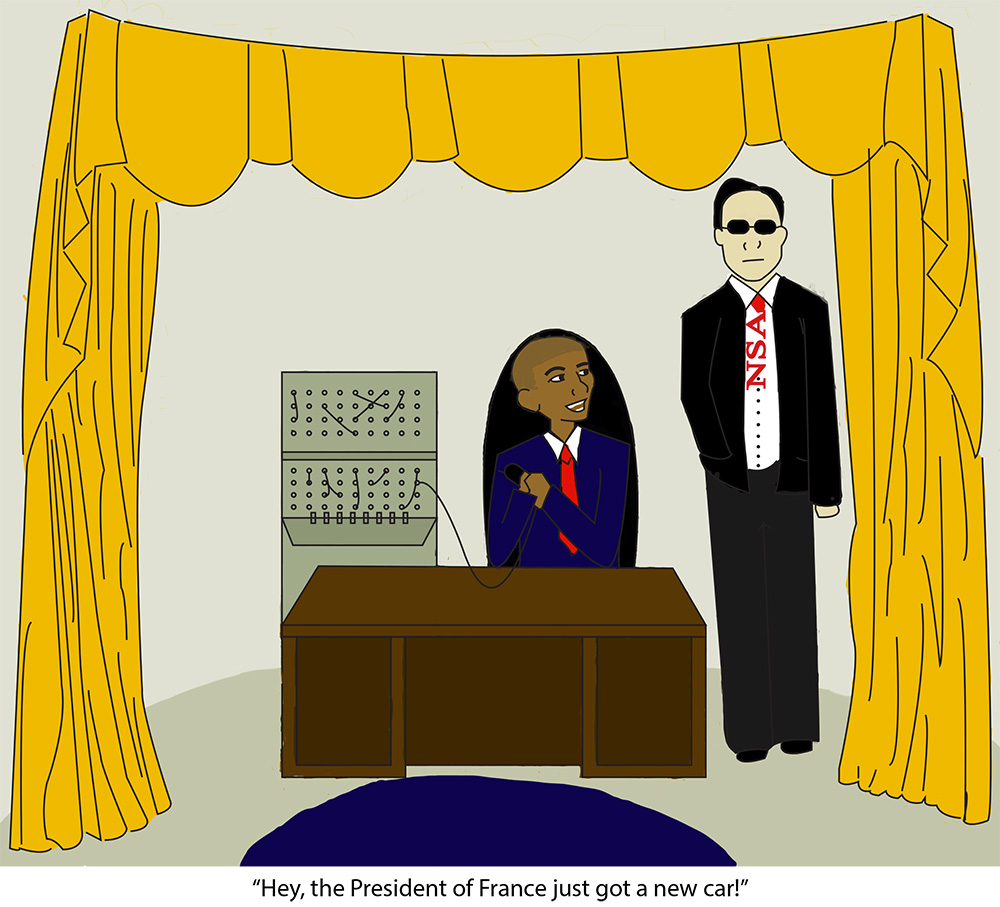EDITORIAL: Are We Heading Toward ‘1984’ In 2013?
HEATHER ALFORD
Mention the words “espionage,” “spy” or the phrase “gathering intelligence,” and most people picture James Bond or the Cold War; mention that the government is spying on innocent civilians, and people may conjure up something more Orwellian.
Throughout the last year, the U.S. government has come under fire for its acts of espionage against its own citizens as well as countries friendly to the U.S. Both President Obama and the National Security Agency (NSA) have been blamed in the spy games.
Government espionage is nothing new. The act of spying has been around for ages and spans into ancient times.
Ever since the United States was conceived, spies were vital for the success of the nation. Paul Revere and Nathan Hale are the two most notable of many agents during the American Revolution from 1774 to 1776.
From 1939 to 1945, World War II employed many agents. Allied intelligence agencies worked against the Axis intelligence agencies, usually trying to steal technology or decipher the enemy’s codes.
The Cold War, which is often dated from 1947 to 1991, is where most people get their idea of spies playing a shadowy game of cat and mouse with Soviet counterparts.
During his presidency from 1969 to 1974, Richard Nixon tape recorded political opponents and people his administration considered suspicious. These recordings would eventually lead to Nixon’s downfall during the Watergate Scandal as they implicated the president with the break in at the Democratic National Committee headquarters at the Watergate complex.
After the tragic events of Sept. 11, 2001, President George W. Bush signed the Patriot Act into law. This act gives the U.S. government the right to spy on suspected terrorists by searching telephone, email and financial records without a court order. In actuality, it expanded the government’s power against civilians’ privacy for the promise of safety.
In June, the British newspaper The Guardian reported the NSA collected telephone records on millions of U.S. citizens from an undisclosed source.
Next, the Washington Post exposed an Internet surveillance program called PRISM (not an acronym), which grants the NSA direct access to systems such as Google, Facebook, Apple, etc.
A few days later, Edward Snowden, a former CIA employee and NSA-contracted computer specialist who worked on surveillance programs, was revealed to be the source of the information leak. Snowden was declared an enemy of the state by the government and fled the country.
In July, The Sydney Morning Herald and Brazilian newspaper
O Globo reported that the NSA was using a program called “XKeyscore,” a program that detects and analyzes Internet data on foreign nationals as well as searches and listens to communications of American citizens without court approval.
An internal NSA audit run in August, as well as top-secret documents, showed thousands of privacy violations committed by the agency. The audit revealed that the agency broke its own internal regulations 2,776 times in one year, even going so far as agents spying on love interests.
Most recently, news agencies learned of the NSA’s efforts to spy on world leaders including the collection of French phone records and the phone tapping of German Chancellor Angela Merkel.
President Obama recently called for an end to the wiretapping of foreign leaders, stating to the media that the U.S. is in the process of reviewing the way intelligence is gathered; however, many are confident that the president was aware of the surveillance, if not directing it.
While surveillance on friendly foreign leaders is not a policy we should endorse with America’s already unpopular view from many nations of the world, most Americans are more fearful of the privacy violations in our own homeland.
Historically, governments that watch their civilians that closely have created a fear-based society and have used the information collected for tyranny.
Nazi Germany and the Communist Soviet Union both employed heavy surveillance of their citizens. Both even started out with what seemed like very real concerns to their governments for enacting such policies such as economic crisis and perceived enemies within their borders.
Most recently, North Korea has been using surveillance to persecute and at times execute its citizens who dissent either politically or religiously.
It is understandable to seek an end to the threat of terrorism that plagues American society these days, but if we trade our freedoms and our comfort for a possibility of safety, the terrorists have already won. America will have fallen and become some blurred, distorted vision of its old self.
As stated by Benjamin Franklin: “People willing to trade their freedom for temporary security deserve neither and will lose both.”
We should all strive to live under the security of freedom, not the stringencies of “Big Brother.”
To combat the watchful eyes of the government and the FISA Improvements Act of 2013, which some are saying is a “fake fix” from the NSA, stopwatching.us has organized rallies and protests like the Rally Against Mass Surveillance that was held Oct. 26 in Washington D.C. Held on the 12th anniversary of the signing of the Patriot Act, the rally included speakers such as NSA whistleblower Thomas Drake, security expert Bruce Schneier, and former Congressmen Dennis Kucinich and Justin Amash in order to educate and gather support for the cause.
Perhaps voices against the government’s spying can grow loud enough that the watchful eyes and listening ears of “Big Brother” will actually hear and finally put an end to this policy against privacy.


